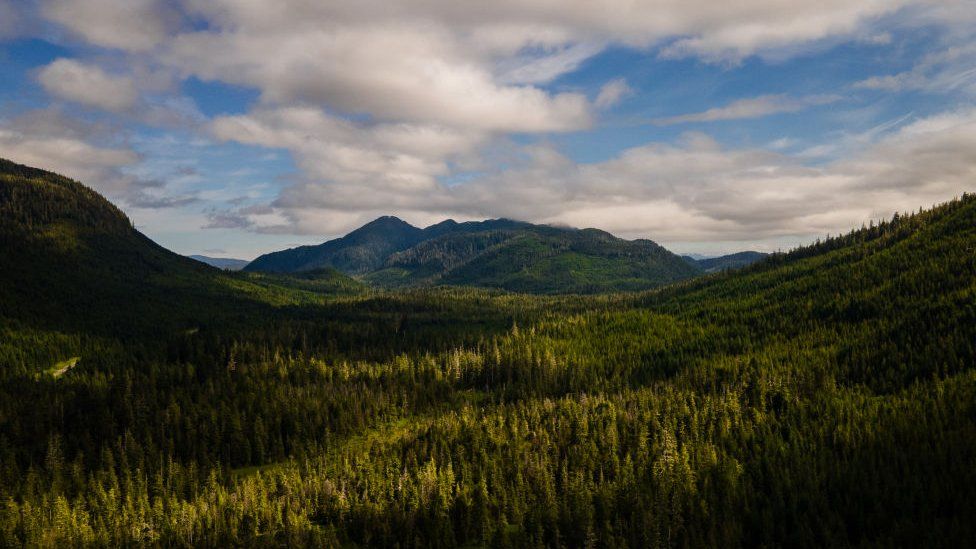ARTICLE AD BOX
 Image source, Getty Images
Image source, Getty Images
By Madeline Halpert
BBC News, New York
Joel Jackson, the president of the Organized Village of Kake, a tribal community, has lived within the Tongass National Forest in Alaska his entire life. His community relies on the land for hunting deer and fishing salmon that swim in streams kept cold by the old-growth forest.
But the 66-year-old worried about damage to that land - the largest national forest in the US - after former President Donald Trump rescinded a measure blocking logging and road-building on nine million acres of land in the Tongass in 2020.
"The forest is key to our survival as a people, to our way of life … for thousands of years," Mr Jackson said.
Last week marked a long-awaited victory for Mr Jackson and other tribes and environmental groups who petitioned the US Department of Agriculture (USDA) to reinstate the protections for the forest.
The agency announced last Wednesday it would once again ban logging and the construction of roads for cutting timber in over half of the Tongass.
The decision follows a years-long conflict between Alaskan Republican officials - who have argued the rule has slowed economic development and that renewing it will hamper efforts to connect remote communities by road, among other concerns - and conservationists, indigenous groups and others who say the measure is key to protecting the environment.
Spanning nearly 17 million acres - an area slightly larger than the state of West Virginia - the Tongass stores 44% of all the carbon dioxide contained in national forests across the country, according to the Alaska Conservation Foundation.
One of the world's largest intact temperate rainforests, it is home to 800-year-old cedar, hemlock and Sitka spruce trees that help provide habitats for over 400 species of land and marine wildlife.
Environmental experts view protecting the forest as key to conserving biodiversity and mitigating climate change.
The decision to reinstate a rule blocking logging and road-building in the Tongass reflects the voices of Tribal Nations and the people of Southeast Alaska, while taking into account the importance of fishing and tourism to the region's economy, US Agriculture Secretary Tom Vilsack said in a recent statement.
The protections - known as a "roadless rule" regulation - were first introduced by former President Bill Clinton's administration in 2001 to shield certain designated areas in US national forests from logging.
In 2020, after lobbying from Alaskan state officials, Mr Trump stripped the protections for the Tongass.
In a statement last week, Alaska Senator Lisa Murkowski, a Republican, argued the Biden Administration's decision to reinstate protections turned "the Tongass into a political football", and would hinder local economic development.
Her comments were echoed by her senate colleague Dan Sullivan, who pledged in a statement to "fight this decision with everything in my power", while Governor Mike Dunleavy called the USDA's move a "huge loss for Alaskans".
But several local businesses and organisations said they disagreed.
Gordon Chew, a co-owner of Tenakee Logging Company, a small family-owned business in the area, said lumber jobs have declined in the Tongass National Forest over the past three decades. But he said this is because of factors such as rising fuel prices for transporting timber from an isolated Alaska and not due to the roadless rule.
"If you believe in global warming, see the value of sequestering carbon, and you like the fishing industry and support tourism, these are all things that the roadless rule enhances," he said.
The roadless rule was always "contentious with Alaska politicians, but not so contentious with the public", said Meredith Trainor, the executive director of the Southeast Alaska Conservation Council.
She argued it is "really important to have the rule in place to have another impediment to a resurgence of logging in these intact forest areas".
While Mr Jackson celebrated the rule change, he said he would not feel relieved until such protections are made permanent, a move he said could require congressional approval.
That could be his next battle, he said.
"I describe walking into the forest as walking into one of the most beautiful cathedrals you'll ever find in the world," he said. "I don't want to have my grandchildren, their grandchildren, to have to fight for that too."
"This could be gone in five to 10 years" - what Alaska’s shrinking island means for all of us

 1 year ago
14
1 year ago
14








 English (US)
English (US)